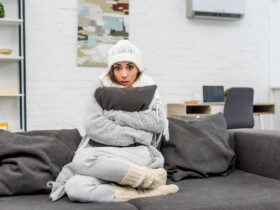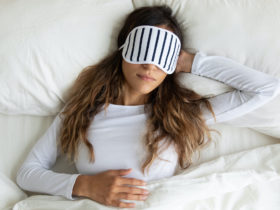Are you tired of tossing and turning at night? Sleeping troubles could be due to factors like stress or a health condition. But there’s one other surprising factor that may contribute to sleep issues:
Your bedroom.
Sleep is one of the best things you can do for your health. So if you want to sleep better, keep reading to learn more about the importance of getting a good night’s sleep and proactive steps to optimize your bedroom for a restful slumber.
The Importance of a Good Night’s Sleep
Lack of sleep can have a significant negative impact on your health. You may feel sluggish and moody the next day when you don’t get a good night’s sleep. Missing out on sleep may lead to an inability to focus, fatigue, and overeating. Studies suggest a lack of sleep may contribute to obesity by increasing levels of cortisol levels, the stress hormone responsible for making you feel hungry during the day.
Get the recommended 6 to 8 hours of sleep each night, and your body will thank you for the benefits:
- Improved learning and better brain function
- Steady mood (no mood swings)
- More energy – both physical and mental
- Healthy heart and lung function
- A stronger immune system
How to Hack Your Bedroom for Better Sleep
Sleep struggles can make your bedroom feel like enemy territory. Stop dreading bedtime by following these tips to optimize your sleep environment.
Choose the Right Bedding
How comfortable are your mattress, pillows, and bedding? If you’re sleeping too hot or waking up with pain, replacing these three items could be the easiest way to sleep better.
- When you shop for bedding, choose lightweight sheets made from natural materials such as cotton or linen.
- Ensure your mattress and pillows support your sleep style and properly align your back and neck for pain-free sleep.
- Choose bedding made from natural materials such as wool, organic cotton, and natural latex that can breathe and wick away moisture to avoid overheating.
Use Colors to Soothe
Colors can have a significant impact on your ability to wind down and relax. Vibrant colors on walls and bedding may be overstimulating. Choose soft pastels and neutral tones in your bedroom, such as soft blues, grays, or tans, to calm your mind and encourage rest and relaxation.
Add Greenery
Houseplants can purify the air and help promote better sleep. Plants like lavender, golden pothos, and snake plants can help promote better sleep by cleaning and oxygenating the air and, in the case of lavender, through sleep-supporting aromatherapy properties.
Use Lighting Strategically
Your body produces melatonin, a hormone that regulates sleep, based on a consistent cycle of light and dark. If your bedroom is too bright, it can make getting a good night’s rest much more difficult by interfering with melatonin production. Your bedroom lighting can definitely impact your sleep quality.
Dimmer switches in the bedroom can help; lower the light levels two to three hours before bedtime. Dimming the light tells your body it’s time to rest. Use a low-wattage bulb in your bedside table lamp if you like to read before you go to sleep. And, lastly, consider blackout curtains to block sunlight from streaming through your windows and keeping you awake.
Turn Down the Thermostat
You may be surprised to find out the ideal temperature for sleep is between 60 and 67 degrees.
Your body temperature naturally drops in preparation for sleep. By sleeping in a cool environment, you can encourage deeper sleep.
Use a fan or air conditioning system to reach a comfortable temperature that will keep you cool throughout the night, and wear pajamas made from lightweight, breathable materials such as cotton or linen.
If you can’t achieve the ideal cool environment for good sleep, try taking a warm bath or shower an hour or two before bed. Your body will begin to cool off, igniting those same sleepy signals.
Reduce Bedroom Noise
Loud noises can be disruptive to your sleep. Create a soothing noise backdrop for your bedroom with a fan, white noise machine, or white noise app.
Stick to a Bedtime Routine
Staying up late or sleeping in on weekends may sound like a well-deserved break from your normal routine, but a varied bedtime routine can disrupt your sleep. Skip the late-night Netflix marathon and do your best to go to bed and wake up at the same time every day. Speaking of Netflix, try and use your bedroom for sleeping only. Leave the TV watching for another space in your home.
Avoid Blue Light Exposure
The “blue light” produced by computers and smartphones can interfere with your body’s natural sleep cycles. A few hours before bedtime, be sure to turn off your electronic devices to signal to your body and mind that it’s time to prepare for sleep.
Relax
Whether it’s a good book, a quick yoga session, or just a few minutes of meditation, try to relax your body and mind before bedtime. Meditation can clear your mind, erase the stress from the day, and help you prepare for sleep If you’re new to meditation, start with a meditation app that provides detailed instructions and guides you through the process.
Avoid Sleep-Disrupting Food and Drinks
The foods and beverages you consume can have an impact on your sleep. Caffeine in coffee, tea, and even chocolate can disrupt your sleep for five to six hours or longer. Late night meals, alcohol, and nicotine are all known sleep-disruptors to avoid in the hours before bedtime.
Try a Sleep App
There are several apps for your smartphone designed to calm the mind and give you a sense of tranquility before you go to bed. Apps are available for sleep tracking, for meditation, white noise, and even personalized sleep cycle alarms that will gently wake you when you enter the just-right phase of sleep.
A good night’s sleep may help you feel healthier, more positive, and better energized to face the day. And optimizing your sleep environment may be the secret to getting that restful, restorative sleep your body craves.











Join the GloWell Community on Social!
Don't risk missing a single thing. Follow us on social and become part of the GloWell community.